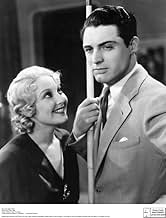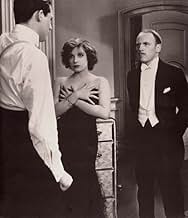Füge eine Handlung in deiner Sprache hinzuAn affair is almost exposed when Claire's husband unexpectedly returns early from the Summer Olympics.An affair is almost exposed when Claire's husband unexpectedly returns early from the Summer Olympics.An affair is almost exposed when Claire's husband unexpectedly returns early from the Summer Olympics.
- Auszeichnungen
- 3 wins total
- Studio Official
- (Nicht genannt)
- Manager of Neopolitan Hotel
- (Nicht genannt)
- Chou-Chou
- (Nicht genannt)
- Porter
- (Nicht genannt)
- Singing Gondolier
- (Nicht genannt)
- Porter
- (Nicht genannt)
- Boulevardier
- (Nicht genannt)
- Man in the Manhole
- (Nicht genannt)
Empfohlene Bewertungen
Then you play the film. The acting is utterly superb, the comic timing superb. The film is cleverly and adventurously put together by the film makers. All the players, Grant, Todd, Ruggles and Young are excellent.
What is there to say about the lead, Damita? Well, with the coming of talking pictures, Damita with her French accent found it tough to get parts that would utilise her exceptional talents. Here is an exception. Not many people know that at Hollywood parties Damita was Chaplin's number one rival when it came to mime during party pieces. In one scene, we get a glimpse at the sort of thing that helped the Hollywood parties go with a swing. In dialogue Damita's comic timing is spot on, which just goes to show that you do not have to be mug ugly to be a comedienne. When she is on screen the laughter is the loudest. And sex appeal? She has been called "a French bombshell." If so, the French have to test her in the Pacific.
It would be criminal to ruin it all by telling everybody what the plot is. All I will say is that if you are not smiling or laughing at this film from beginning to end, then there is something wrong with YOU.
So next time you see a list of the 100 best films ever made, ignore it. My advice to you is to go out and find your own 100 best films. If you don't, you could miss gems like this, and the loser will be YOU.
This movie has all the earmarks of a Lubitsch picture: the European settings (Paris, Hollywood, which Lubitsch said he much preferred to Paris France; Venice, where he had set the opening of TROUBLE IN PARADISE two years earlier) and is the sort of racy European comedy that Paramount specialized in until the Production Code killed them dead later that year. The setups are all Lubitsch: the recitative number "Madame Has Lost Her Dress" that opens the movie; The sexual imagery of Cary Grant carrying around a bagful of javelins and reducing Roland Young and Charlie Ruggles to blithering idiocy; Thelma Todd in her underwear; and into this mess lands Lily Damita, an honest girl reduced to sleeping on movie sets: trouble in Paris, Hollywood.
Although Tuttle lacks the ability to direct actors in the small, exquisite details that Lubitsch did, he had a fine hand at framing and storyline. The movie is near perfect, except for the miscasting of Roland Young as the love interest..... but perhaps that is the point of the matter: we do not always fall in love with Maurice Chevalier.
A great cast of more or less sympathetic characters surrounds the lovely Damita:
Roland Young and Charlie Ruggles are fine as a pair of wealthy gentlemen of Paris. Young is about to embark on a clandestine Venetian trip with girlfriend Thelma Todd—when her husband, Olympic javelin-thrower Cary Grant, unexpectedly returns home. One lie leads to another, and soon Young has hired an actress—Damita, eager to accept any job—to pose as his wife, and the whole gang boards a train for Venice.
Thelma Todd is excellent as the deceiving wife jealous of her lover's new partner; we don't get to see Todd angry in many of her movies, but smoke positively comes out of her ears here. Cary Grant—very youthful and athletic, bag of javelins slung over his shoulder—has a minor role but is awfully fun to watch (in his first picture).
Roland Young is outstanding as the would-be cosmopolitan lover who can't quite control either Damita or Todd; his face and mannerisms express varying degrees of discomfort, frustration and worry as he struggles to keep multiple relationships from caving in on him.
A hilarious running gag involves chauffeur Irving Bacon repeatedly catching Thelma's dress—in a car door, for example—and accidentally pulling it off.
Overall, it's very funny, with a plot that is tough to predict and somewhat surprisingly, it gradually turns into a very sweet picture, at that. Very enjoyable, especially for fans of these great character actors—and well worth watching just to see Roland Young and the great Thelma Todd together.
So all of this experimental art design is the backdrop for a pretty typical precode farce. Bachelor Gerald Gray (Roland Young) is having an affair with married Claire Matthewson (Thelma Todd). They plan to take a trip to Venice together because Claire's husband (Cary Grant as Stephen Mathewson) is at the summer Olympics throwing the javelin. But he returns unexpectedly, just in time to see the two train tickets that his wife had ordered. A poorly constructed alibi is devised - Claire was planning to take the trip alone. The two tickets were mistakenly left there for neighbor Gerald and his wife. Stephen suspects what is going on and insists that he and Claire take that trip and that Gerald and his wife come along on the journey with them, not believing that there actually IS a wife. So Gerald hires a starving actress (Lili Damita as Germaine ) to play the part of his wife. But even this is a switcheroo as the actual actress hired for the job (Claire Dodd) doesn't want it and gives it to Germaine. Complications ensue.
If Cary Grant had been just a couple of years further along in his film career, doubtless he would have had the part of the carousing bachelor and Roland Young would have been the cuckolded but suspicious husband and the film would probably have been better for it. But Grant is humorous carting around those javelins as phallic symbols. Irving Bacon was an odd choice for Roland Young's butler in a continental setting since he really seems like he would be better suited working in Mr. Drucker's store in Hooterville.
I'd recommend it for the weirdness of it all and to see Cary Grant in his first film role.
This Is The Night has Cary Grant as a French Olympic athlete whose sport is the javelin. But apparently he's not spearing Thelma Todd enough and she's casting a roving eye. The eye of Roland Young meets her's and the two plan a holiday in Venice.
To which Mr. Grant arrives and rudely interrupts. Thinking fast on his feet as American Express agent Charlie Ruggles arrives with tickets at Todd's apartment, Young says that he'll be traveling with his wife and once outside frantically looks for a wife. He finds Lily Damita and hires her for a railroad holiday from Paris to Venice. Ruggles goes along as a fifth wheel on this carriage, presumably to catch whoever comes flying off the rebound. As he's soused most of the time, I can't see what appeal he would have. Of course I can't see what appeal he would have sober.
Cary Grant was billed fifth in this film, but in 1932 he gradually went up the billing ladder and by the time of She Done Him Wrong, he's co-starring with Mae West. His debonair charm could barely be concealed in a role which required him to be a bit of a fathead.
Ralph Rainger and Sam Coslow wrote a couple of forgettable songs and it's in the musical numbers that this film bares the closest resemblance to Love Me Tonight. Note the Italian gondolier in the Venice scenes. He gets no billing in the film, but it is Donald Novis one of the most popular singers of the day on radio. In three years he would move to Broadway and play the romantic lead in Rodgers&Hart's Jumbo where he would introduce The Most Beautiful Girl In The World and My Romance. Novis had a wonderful tenor voice as you'll agree if you see this film.
Speaking of Rodgers&Hart maybe if they wrote a score as good as the one they did for Love Me Tonight, This Is The Night would be more remembered than as footnote as Cary Grant's feature film debut.
Wusstest du schon
- WissenswertesFilm debut of Cary Grant.
- PatzerWhen Bunny and Stephen, carrying his javelins, after arriving back unexpectedly from his trip to the Olympics, go into the next room, a large shadow of the boom microphone can be seen moving on the doorway and wall behind it.
- Zitate
Claire Mathewson: [they are seated in the back of their car; Claire has had her dress torn by the car door] Gerald, aren't you going to do anything?
Gerald Gray: Here?
Claire Mathewson: No, no. I mean about discharging your chauffeur
Gerald Gray: Oh, oh let me keep him. I've let you keep your husband
Claire Mathewson: I haven't kept him
Gerald Gray: What?
Claire Mathewson: He left this morning
Gerald Gray: For good?
Claire Mathewson: No, no, for the Olympic Games at Los Angeles. He's in them, you know. Haven't you ever heard of Steve Mathewson, the javelin thrower?
Gerald Gray: Javelin thrower?
Claire Mathewson: ah ha
Gerald Gray: Do you mean those long, murderous harpoon things?
[she nods]
Gerald Gray: Claire, the moment you meet a man, right after you've said 'how do you do?' you should add 'my husband throws javelins'.
- VerbindungenRemake of Good and Naughty (1926)
- SoundtracksThis Is the Night
Written by Sam Coslow and Ralph Rainger
Top-Auswahl
- How long is This Is the Night?Powered by Alexa
Details
- Erscheinungsdatum
- Herkunftsland
- Sprachen
- Auch bekannt als
- This Is the Night
- Drehorte
- Produktionsfirma
- Weitere beteiligte Unternehmen bei IMDbPro anzeigen
- Laufzeit1 Stunde 20 Minuten
- Seitenverhältnis
- 1.33 : 1
Zu dieser Seite beitragen
































